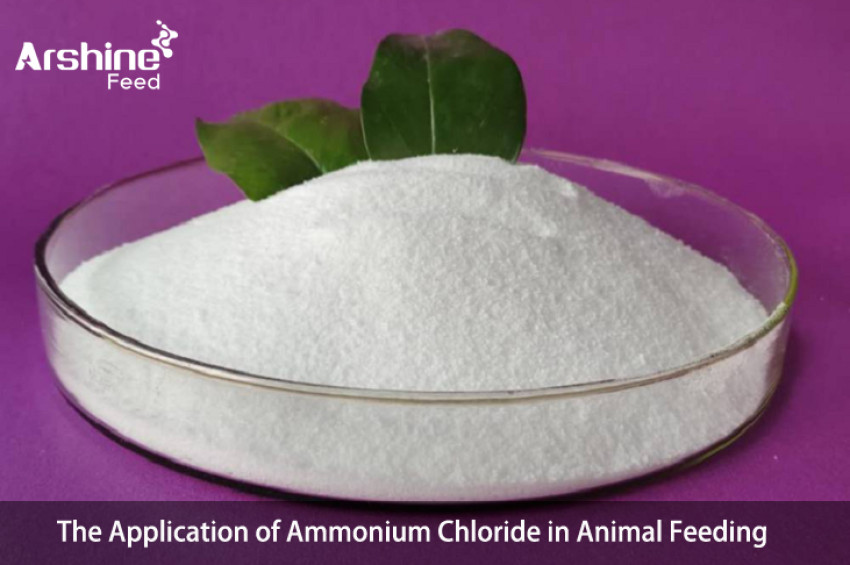
Introduction:
Ammonium chloride is a versatile and valuable compound with various applications in different industries, including animal husbandry. In animal feeding, ammonium chloride serves multiple purposes, providing benefits that contribute to improved animal health, nutrition, and overall performance. In this comprehensive article, we will delve into the diverse applications of ammonium chloride in animal feeding, its significance in maintaining acid-base balance, preventing urinary calculi, and optimizing nutrient utilization.
Ammonium chloride (NH₄Cl) is a salt composed of ammonium ions (NH₄⁺) and chloride ions (Cl⁻). It is a white crystalline powder with a mildly acidic taste and is highly soluble in water. Ammonium chloride is commonly used in various industries, including agriculture, pharmaceuticals, and food production.
In animal feeding, ammonium chloride serves as a valuable nutritional additive, offering a range of advantages that positively impact animal health and well-being.
1.Maintaining Acid-Base Balance:
Ammonium chloride plays a crucial role in maintaining the acid-base balance in animals. The acid-base balance, also known as the pH balance, is a critical physiological parameter that affects various bodily functions.
When animals metabolize dietary proteins, nitrogenous waste products are generated, including ammonia (NH₃). Ammonia can increase the alkalinity of the blood, potentially leading to metabolic imbalances. However, ammonium chloride helps counteract this effect by converting ammonia into ammonium ions, a process known as acidification.
The acidification effect of ammonium chloride helps regulate the pH of the blood and other body fluids, ensuring optimal physiological function and overall animal health.
2.Preventing Urinary Calculi:
Urinary calculi, also known as water belly or kidney stones, is a common condition in ruminant animals, particularly in male animals. It is characterized by the formation of mineral deposits in the urinary tract, leading to painful blockages and potentially life-threatening complications.
The formation of urinary calculi is often attributed to imbalances in dietary mineral intake, especially an excess of calcium and phosphorus. These minerals can combine with other substances in the urine to form solid stones.
In animal feeding, ammonium chloride is used as a preventive measure against urinary calculi. By acidifying the urine, ammonium chloride helps dissolve mineral deposits, reducing the risk of stone formation and alleviating the burden on the urinary system.
3.Optimizing Nutrient Utilization:
Ammonium chloride aids in optimizing the utilization of dietary nutrients, particularly protein. When animals consume protein-rich diets, excess nitrogen is released during the metabolism of amino acids.
Excessive nitrogen can strain the liver and kidneys, leading to nitrogen waste accumulation and potential health issues. However, ammonium chloride helps reduce the excess nitrogen load by facilitating the excretion of ammonia through urine.
This process allows for better protein digestion and utilization, improving feed efficiency and minimizing nutrient wastage.
4.Enhancing Rumen Function in Ruminants:
Ruminant animals, such as cattle, sheep, and goats, have a unique digestive system that involves fermentation of plant materials in the rumen. The rumen is a specialized compartment in the stomach where beneficial microorganisms break down complex carbohydrates into simpler compounds that the animal can digest.
Ammonium chloride aids in the maintenance of an optimal rumen environment. The acidification effect of ammonium chloride supports the growth and activity of beneficial rumen microorganisms, enhancing fermentation and nutrient absorption.
By promoting a healthy rumen function, ammonium chloride contributes to improved feed digestion and energy utilization in ruminant animals.
5.Supporting Poultry Health and Performance:
Ammonium chloride is also beneficial in poultry nutrition. It can be used as a dietary additive to prevent the occurrence of urinary calculi in birds, similar to its application in ruminants.
In addition to its urinary calculi prevention benefits, ammonium chloride supports poultry health by maintaining proper acid-base balance and optimizing nutrient utilization.
6.Customizable Application in Feed Formulation:
One of the advantages of using ammonium chloride in animal feeding is its flexibility in feed formulation. Animal nutritionists can incorporate ammonium chloride into different feed formulations based on the specific needs of the animal species, production stage, and dietary requirements.
This adaptability allows producers to tailor the inclusion of ammonium chloride in the feed to address specific challenges or improve overall animal health and performance.
Conclusion:
Ammonium chloride is a valuable nutritional additive in animal feeding, offering multiple benefits that positively impact animal health, nutrient utilization, and performance. Its role in maintaining acid-base balance, preventing urinary calculi, and supporting rumen function in ruminants makes it an indispensable component of modern animal nutrition.
With its versatile applications and customizable feed formulations, ammonium chloride continues to be a valuable tool for animal producers seeking to optimize animal health, welfare, and productivity. When used responsibly and under proper guidance, ammonium chloride exemplifies how innovative nutritional strategies contribute to sustainable and efficient animal husbandry practices.
https://www.arshinefeed.com/Knowledge/the-application-of-ammonium-chloride-in-animal-feeding




